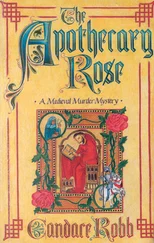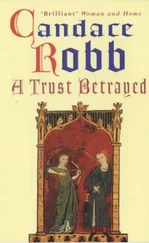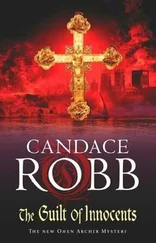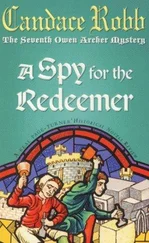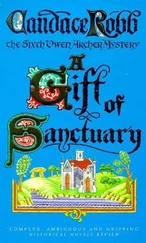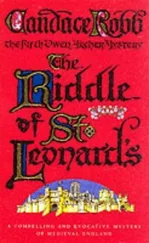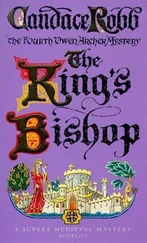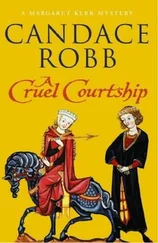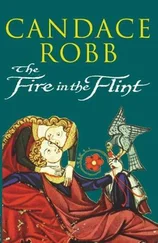Jehannes looked surprised. “Never. He is a good man.” When Owen’s eyebrow rose, the Archdeacon shrugged. “As good as the circumstances allow him to be.”
“That smacks of cynicism.”
“It is not meant that way, truly. You are a fortunate man to serve His Grace.”
Owen could see that his friend was in earnest. Having nothing polite to reply to that, he chose to move on to practical plans. “When will the letters arrive?”
“I should think fairly soon.”
Delayed by a bilious stomach, John Thoresby now hurried to a meeting with the King, his robes sailing round him, his eyes squinting to see ten steps ahead. He cursed the indignities of age that made him so much more conscious of his mortal shell than ever before – stomach, eyes, joints. The disintegration of his body seemed to be accelerating of late. So why was he plotting Wykeham’s disappointment? Would it not be a relief were Wykeham to take the chancellor’s chain from round his neck and lighten his load? In comparison, his duties as Archbishop of York were nothing.
Round the corner he hastened, down shallow stone steps, pushed open the heavy door, gasped as the cold, damp air hit him. It was not so much colder without than within, but it was damper, with a brisk wind that rushed the chill to the bone. Down through the winter garden the chancellor walked, a bit slower now, the air sharp in his lungs.
Thoresby slowed as he noticed a couple standing in the shadow of the doorway just ahead, hissing at one another in loud whispers. He was disappointed that he could not make out their words, for the woman was Alice Perrers. Even with his failing eyesight, Thoresby found her hated form unmistakable. But he could not make out the man’s features. He stepped closer.
Alas, the two caught the movement and quickly separated, rushing in different directions. Disappointed, Thoresby continued through the doorway, consoling himself with the thought that the court might yet be rid of that strident-voiced, meddling commoner, Alice Perrers. In fact, it spurred him on to his meeting and his resolve to deliver to the King his carefully worded letters, calculated to make the abbots uneasy. The ploy was underhand and deceitful, but Thoresby felt the end was to the country’s benefit. He plotted against Wykeham not so much to keep the office of chancellor, as to win Lancaster’s support in his efforts to separate the King from his despised mistress.
Thoresby told himself that he was defending the Queen’s honour, but it was Phillippa herself who had first shown Perrers preference. Had Alice not been the Queen’s favourite, she might never have been placed in such constant contact with the King. The Queen feigned ignorance of the affair by never mentioning it. But everyone at court knew that Perrers’s little bastard was the King’s. It sickened Thoresby to think of the hurt that the kindly Queen hid so well.
The unpleasant truth was that the Queen’s honour accounted for only part of Thoresby’s animosity towards Alice Perrers. The other reason was shameful. He lusted for her. No matter the prayer, the penance, the staunch resolve, when he looked on her his blood ran hot. Which made him hate her all the more. Her presence at court was a constant torment. And thus he was resolved to rid the court of her. Or to leave himself.
At the door to the King’s chambers Thoresby paused, checking his clothes, dabbing the sweat from his upper lip and temples, straightening his chain of office, clearing his throat. He then nodded to the door warden to knock. A servant opened the door from within, announced Thoresby. Sweet Heaven, when had the King adopted such ceremony in his own apartments?
Thoresby was disappointed to see William of Wykeham, ascetic and sombre in his clerical robes, already seated near a window, his long, slender hands folded calmly in his lap, heavy-lidded eyes cast discreetly down. Thoresby had thought he was to see the King alone, a chat between old friends.
“Ah, there you are, John.” Edward came forward, arms outstretched, stopping short of touching Thoresby. He made a sweeping motion towards the table at which Wykeham sat. “Come, sit with us. We have much to discuss.”
A servant brought wine, which Thoresby accepted but let stand for now. Wine taken too soon after activity would bring on a cold sweat, and he must not appear nervous or even uncomfortable in front of Wykeham.
The King settled himself in a well-cushioned chair. As soon as he sat, out came the dagger with which he increasingly expressed himself in conversation, stabbing here, jabbing there. It was as if with the stooping of his once mighty shoulders and the clouding of his once piercing eyes Edward had chosen the dagger to instil fear in his people. “So. Well met, my counsellors. You have something for me, John?”
“I have indeed, Your Grace. Letters for the abbots of Fountains and Rievaulx.” Thoresby pulled them from his purse, handed them to the King’s servant, who waited beside the Archbishop’s chair.
Edward squinted at the documents, then back to Thoresby with raised eyebrows. “Already sealed?”
On second thought, Thoresby had decided that the King would see through his crafty prose and had sealed the letters. The King might yet open them, but he might not. Thoresby creased his brow in an expression of concern. “You did not wish me to put the seals of chancellor and archbishop on them, Your Grace? Forgive me, I misunderstood. I thought you wished to impress on them the weight of my opinion.”
The King said nothing, holding Thoresby’s eyes with his old power. Thoresby regretted the ploy. Wykeham gave a nervous cough that echoed in the lengthening silence. The floorboards creaked as the servant shifted his weight. Thoresby’s own heartbeat thundered in his ears. The King sat with his back to the window, so that the light caught the coarse white hairs on his ears, the seams in the royal neck.
Oh Edward, Edward, we grow so old. Please, my King, be wise in your last years. Put that she-devil from you and comfort sweet Phillippa , Thoresby prayed silently.
The King suddenly smiled. “Of course that was the point, John, and you did well to seal them. You are as competent as ever.”
Now Thoresby yearned for the wine, but he must wait until his heartbeat slowed, else his hands would tremble and give him away.
Wykeham, however, was not so wise. He grabbed his goblet and took a good, long drink, returning it to the table with a nervous clatter.
The King grinned unpleasantly at his protégé. “What, William? Did my silence make you nervous?” He sat back, studied Wykeham, who dropped his eyes to the table directly in front of him. “Are you easily bullied, William? How then will you stand up to His Holiness?” Edward turned to Thoresby. “Am I making a mistake, John? Is William too gentle to be my bishop?” Thoresby thought Wykeham’s rising colour could as easily be caused by anger as by fear. But Edward did not wait for a reply; he closed his eyes, shook his head. “God will guide me.” He opened his eyes, leaned forward, pointed the dagger at Thoresby. “Captain Archer is standing ready?”
Thoresby hesitated only a second, accustomed to the shifts in the King’s moods. “By now he has received his orders, Your Grace.”
“And the Archdeacon of York?”
Thoresby bowed towards Edward. “And the Archdeacon, Your Grace.” Calm now, he lifted his cup to his lips, drank deeply.
“So,” the King continued, “we have the letters, the York contingent, all that is still to do is send the letters north, eh?” He nodded to himself. “Townley, Gaunt’s spy, is to lead the party north.”
Thoresby choked on a second sip of wine, managed to mask it as a cough. John of Gaunt’s spy? Was this Lancaster’s move to foil Wykeham?
Читать дальше


